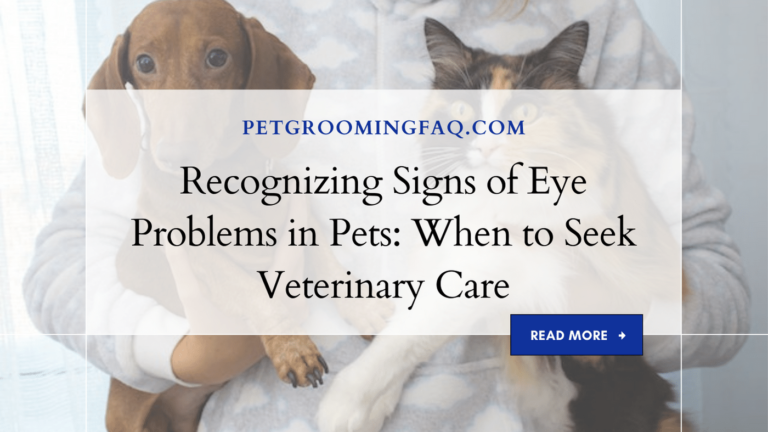How to Recognize and Treat Common Ear Infections in Pets
As a pet owner, we all want to keep our furry friends healthy and happy. One of the most common health issues that our pets may face is ear infection. Although it’s normal for some breeds to develop ear problems, it can still be worrisome when you see your four-legged friend itching and shaking their head uncontrollably.
Fortunately, identifying and treating ear infections in pets doesn’t have to be difficult! In this blog post, we’ll discuss everything you need to know about recognizing and treating common ear infections in pets so you can help your beloved companion feel better quickly. So get ready to take notes because we’re diving into the nitty-gritty of keeping your pet’s ears clean and healthy!
What are Ear Infections?
Ear infections are a common problem in pets. They can result from a variety of things, including the spread of an infection from another part of the body, something that goes into the ear canal, or even a blockage in the ear canal. There are several things you can do to treat an ear infection in your pet:
-Load up on antibacterial medications – Most ear infections can be treated with antibiotics. Ask your vet for some specific recommendations based on the type of infection and the age of your pet.
-Put drops in your pet’s ears – Applying drops of ibuprofen or other pain relief medications directly to your pet’s ears can help to clear up an ear infection quickly.
-Give your pet sterile water – If the discharge from your pet’s ears is pus, offer them fresh water instead. Tap water may also be infected and should not be given to pets.
-Bathe your pet – If the discharge from your pet’s ears is pus, offer them fresh water instead. Tap water may also be infected and should not be given to pets.
-Elevate their head – If the ear infection is severe, your pet may need to be raised up on a pillow or special garment to allow drainage from their ears.
Causes of Ear Infections in Pets
Ear infections in pets are a common problem and can be difficult to treat. There are many different causes of ear infections in pets, and the treatment will depend on the specific condition. Some common causes of ear infections in pets include: • Ear wax blockage: This is the most common cause of ear infections in dogs and cats.
Ear wax can become lodged between the ear canal and the eardrum, causing pressure and inflammation. There are many ways to remove this wax, but it’s important to do it correctly so that the infection doesn’t return.
- Allergies: Pets may develop allergies to things like pollen, dust mites, or even fleas. This can lead to an overreaction of the immune system and an infection. Pets with allergies often have swollen eyes, runny noses, or sneezing episodes after being exposed to things that cause an allergic reaction.
- Dry air: Many pet owners fail to keep their pets adequately hydrated due to concerns about water waste or lack of access to drinking fountains in their neighborhoods. This often leads to chronic dryness inside the ears, which can easily lead to infection.
- Parasites: Several types of parasites can cause ear infections in pets, including roundworms, tapeworms, and fleas. These parasites can get caught in the hair around the ear canal, where they can cause infection.
Treatment for ear infections in pets will likely center around relieving the discomfort caused by the infection and treating any underlying medical conditions. Pets may need to be treated with antibiotics or other medications to clear the infection. In some cases, surgery may be necessary to remove wax or other debris that has blocked the ears.
Symptoms of Ear Infections in Pets
Ear infections are the most common health problem in pet animals, and they can be very dangerous. Pets with ear infections can’t hear well and might not eat or drink properly. Ear infections in pets often become complicated and require antibiotics treatment.
Pet owners should always keep a close eye on their pets for signs of an ear infection, including:
-droopy earlobes
-foul smell from the ears
-increased crying or whining
-redness or pus inside the ears
-swelling or fluid accumulation inside the ears
If you think your pet has an ear infection, take them to the veterinarian for a checkup.
Treatment for Ear Infections in Pets

There are a lot of different ear infections in pets, and the treatment varies depending on the cause. In most cases, antibiotics will resolve the infection. However, other treatments may be necessary if the infection is caused by an additive such as repellent ear mites. Here are a few tips to help you recognize and treat common ear infections in pets:
1] Check for symptoms. Ear infections can vary in their severity, so it’s important to pay close attention to your pet’s behavior and appearance. Some signs that your pet may have an infection include discharge from the ear, persistent inflamation or redness inside the ear, decreased appetite or sleeping patterns, and difficulty hearing or speaking.
2] Examine the ears closely. If you think your pet has an infection, check their ears closely for signs of inflammation or redness. If there is discharge from the ear or visible otitis media (a complex form of middle-ear infection), it’s likely that antibiotics would be effective treatment at this point.
3] Treat with antibiotics if appropriate. If your pet has an acute outbreak of an infection – meaning they’ve had all of the above signs within a few days – then antibiotic treatment is usually indicated regardless of the underlying cause(s). This includes cases where there is no clear indication as to what triggered the infection (reminder: many common household items can trigger ear infections in pets).
4] Avoid over-the- counter treatements. Many over-the-counter ear medications available in pet stores are meant to relieve symptoms and are not typically effective against bacterial infections. If your pet has an acute outbreak, consult a veterinarian for specific treatment recommendations.
5] Clean the ears regularly. Make sure to clean the inside of your pet’s ears regularly, even if they don’t show any signs of an infection. This can help to prevent further buildup of bacteria and reduce the number of ear infections your pet will experience.
6] Treat underlying causes. If you believe that the underlying cause of your pet’s ear infection is something that can be fixed (e.g., food allergies, excessive noise exposure, etc.), then addressing that issue will help to improve their overall health and decrease their likelihood of developing future ear infections.
Prevention of Ear Infections in Pets

There are several things you can do to help prevent ear infections in your pet. Clean the ears with soap and water at least once a week. Dry the ears carefully, using a soft cloth if necessary. If your pet acquires an ear infection regularly, try to identify the cause and treat it accordingly. Some of the most common causes of ear infections in pets include: Keeping the pet’s environment dirty
Not cleaning their ears regularly
Contacting parasites like yeast or bacteria in their environment
Having a sick pet with a high fever For young pets, it’s also important to keep them entertained and active so they don’t nap too much and allow their immune system to lapse.
If your pet has an ear infection, take them to the vet as soon as possible. The vet will prescribe antibiotics and other treatment options.
Conclusion
Pets are a family member, and they deserve our best care. When one of our furry friends becomes ill, we want to do everything in our power to help them feel better. One way to do that is by recognizing the signs of common ear infections in pets, and then treating them appropriately.
If you ever notice any of the following symptoms in your pet, be sure to consult with your veterinarian: discharge from the ear canal, difficulty hearing properly, fever, reduced appetite or hunger pangs, frequent yawning or sneezing. By taking these simple steps early on in an episode of illness, you can help ensure that your pet gets the treatment they need and makes a speedy recovery.








2 Comments